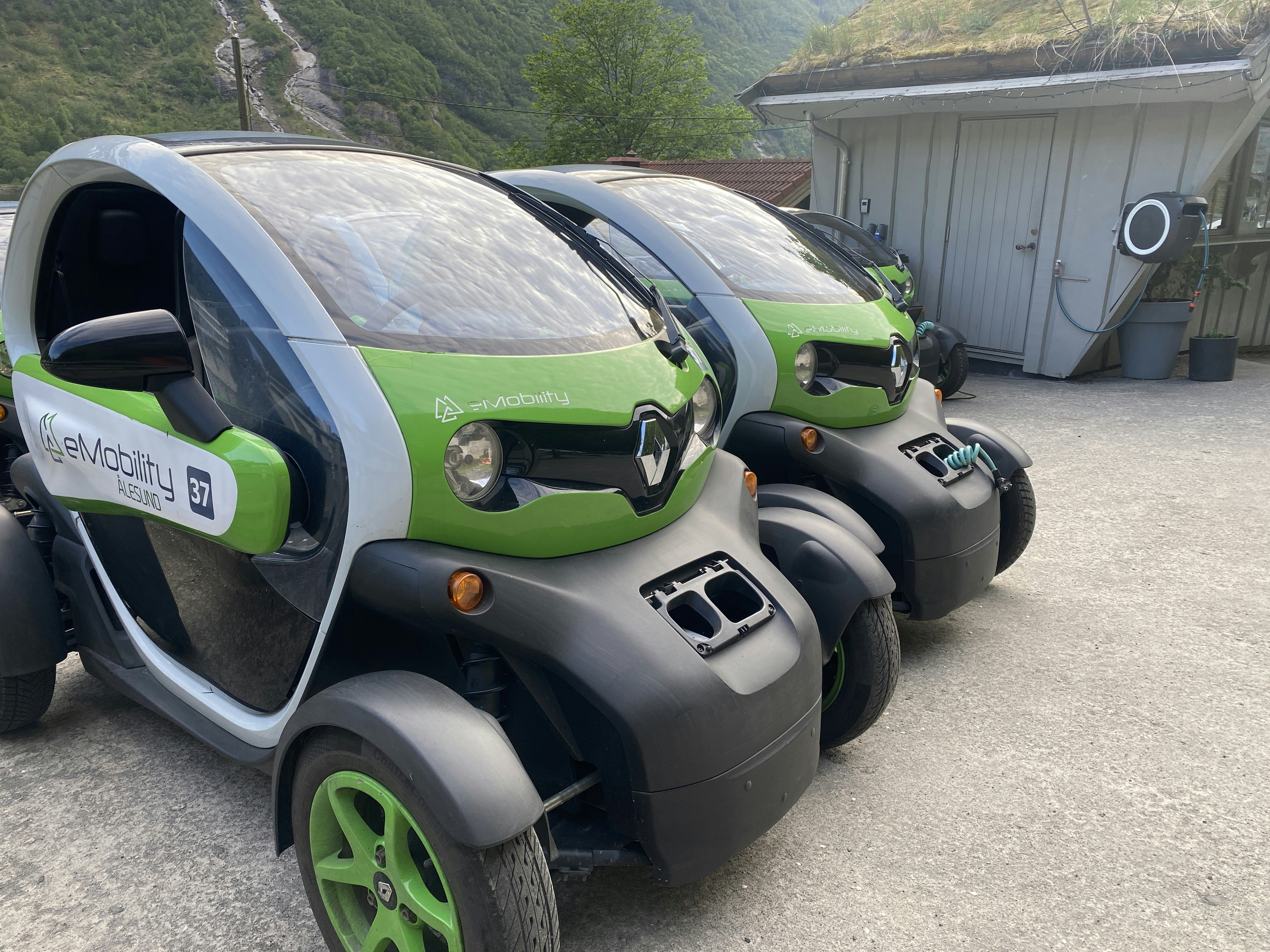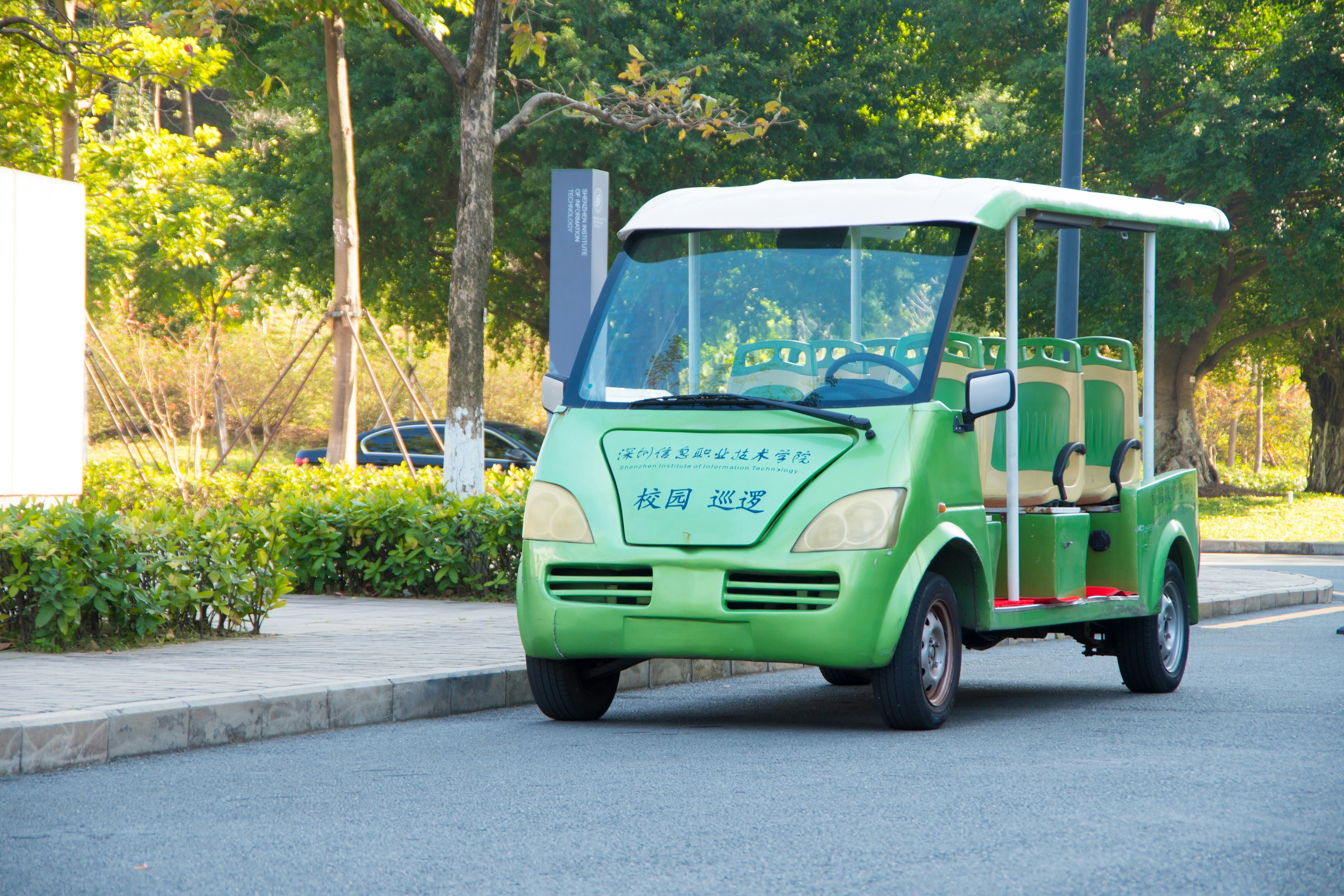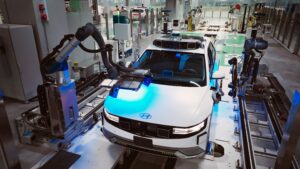Rick Newman is a senior columnist for Yahoo Finance.
I purchased my first battery-powered lawnmower practically 10 years in the past as an experiment. It was successful, and many of the different machines in my storage — trimmer, weed whacker, chain noticed, rototiller, leaf blower, snow thrower — are actually powered by batteries I recharge from {an electrical} outlet.
My automobile, nevertheless, shouldn’t be electrical, and I nonetheless don’t foresee a day after I’ll select an electrical car over a gasoline-powered one. I like EV expertise, and I’m glad most automakers are rolling out electrics. However EVs are too far above the practicality curve for me, and it’s not clear if or after they’ll fall inside it.
The alternatives on show in my storage are actually taking part in out within the broader marketplace for EVs, the place automakers are starting to pause aggressive efforts to transition quickly from gas-powered automobiles to electrics. EV gross sales are nonetheless rising. They’ve jumped from barely nothing just a few years in the past to eight% of all new automobile gross sales. However demand appears to be flagging, forcing automakers to chop costs for EVs, which aren’t worthwhile but for many firms that make them.
Ford, Basic Motors, Honda, and Volkswagen have scaled again EV plans just lately or warned about disappointing gross sales. Even high-flying Tesla, which solely makes electrics and misplaced cash for 14 years earlier than turning its first revenue in 2020, is slashing costs and delaying the opening of a brand new manufacturing facility in Mexico.
None of this implies EVs are a failure. The problem most automakers face is predicting adoption charges for the brand new expertise and adjusting their manufacturing plans to match what’s mainly a shifting goal. Retooling meeting strains to change from gas-powered automobiles to electrics is cumbersome and costly. So is opening new factories to construct EVs or elements similar to the massive battery packs they require.
Rising rates of interest, in the meantime, are forcing consumers to alter their plans. And now, the kind of gasoline that powers your automobile has develop into a political difficulty. Former President Donald Trump has determined EVs = unhealthy, calling them the “ridiculous all-electric automobile hoax.” He’s improper. EVs are right here to remain. However they’re not for everyone, and along with all the opposite issues involving a automobile, potential consumers now need to ask whether or not an EV suits their political model.
The most important unknown about EVs is how a lot of the market they’ll represent at any given time limit, and how you can get the supply-demand steadiness proper. President Biden, who promised to “finish fossil gasoline” as a presidential candidate in 2019, desires half of all new automobiles to be zero-emission automobiles by 2030. For probably the most half, meaning electrics. However Biden can’t power folks to purchase EVs. He can solely set rules and signal laws giving them cause to take action, such because the EV tax credit that have been in final yr’s Inflation Discount Act.
Evaluating the professionals and cons of electrification as you progress up the equipment chain from energy instruments to vehicles helps clarify why there could also be a requirement ceiling for present EV expertise. My battery-powered lawnmower is a success as a result of the expertise forces no tradeoffs on me. It price slightly bit greater than a gas-powered mannequin, however there’s no gasoline, oil, or different messy fluids, and I cost it at residence. There’s mainly no upkeep, both. You simply pop in a contemporary battery and begin it up such as you would a vacuum cleaner. It’s quieter than fuel mowers, and I don’t pollute the air or breathe in carcinogens whereas mowing.
As I used to be scripting this story, I made a decision to scribble some methods of measuring the usefulness of assorted gizmos, and ended up drawing my private practicality curve, as you may see beneath. There are not any numerical values related to the assorted merchandise I’ve plotted on this chart. All I need to convey is the relative enchantment of various kinds of merchandise, based mostly on what I worth as a shopper.
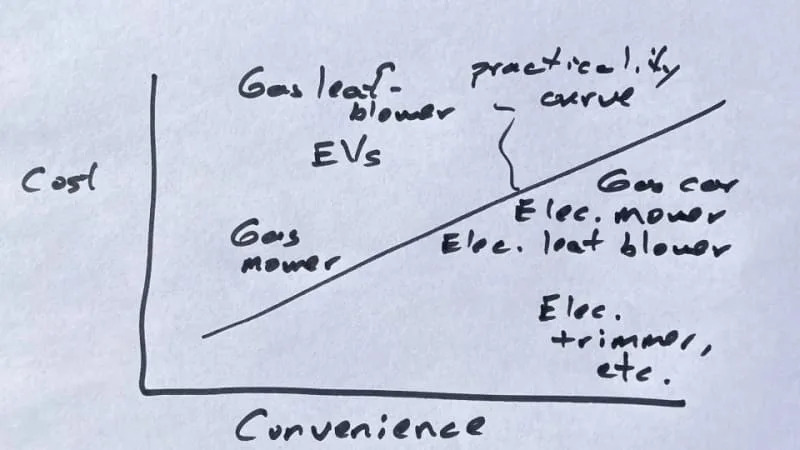
Value is on the vertical entry and comfort is on the horizontal axis. I’m keen to pay extra money for extra comfort, and vice versa, which is why my practicality curve rises from left to proper. I outline comfort broadly to incorporate what I need from these merchandise, which for me is ease of use, reliability, and a way that I’m being a considerate shopper. Your outcomes could fluctuate.
I might have purchased a fuel mower as an alternative of my electrical for rather less cash, but it surely scores low on comfort as a result of I’d have to purchase fuel for it, preserve it, and tolerate unnecessary noise and air pollution. So it falls exterior my practicality curve.
[Drop Rick Newman a note, comply with him on Twitter, or join his publication.]
The worst machine on the planet proper now’s the gas-powered leaf blower, which generates obscene quantities of noise and air pollution within the service of vanquishing leaves or mud. It occupies the worst spot on my practicality chart, within the northwest quadrant, the place it’s a horrible mixture of price and comfort.
All my battery-powered electrical instruments fall contained in the practicality curve for a similar causes my lawnmower does: no liquid fuels, no upkeep, all the time prepared, plus they’re quieter and cleaner than gas-powered equivalents. I’ve a small yard, although, and if I needed to handle an acre or extra, these instruments won’t be as much as the job.
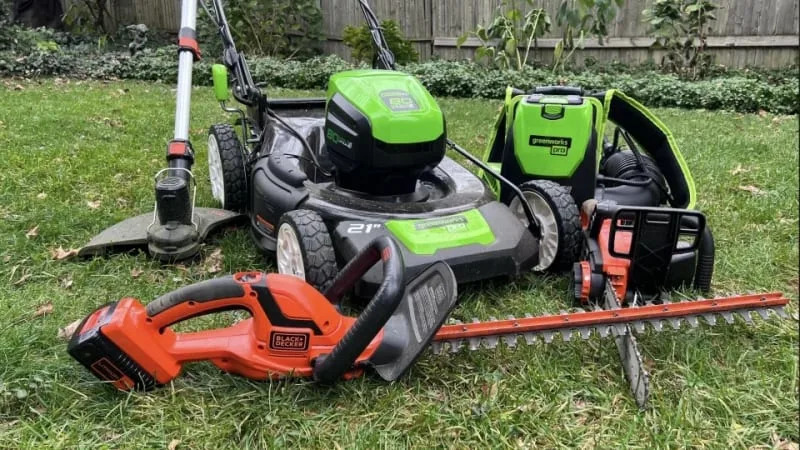
Now for the automobiles. I’ve just one automobile, and I am going on lengthy journeys typically when I’ve to fuel up alongside the way in which. I merely want the vary and simple refueling that comes with a gas-powered automobile. EVs are perfect for individuals who by no means drive lengthy distances, or who’ve multiple automobile, together with a gas-powered one they will use for highway journeys.
Sure, you may take lengthy journeys in an EV. However charging takes rather a lot longer than filling with fuel, underneath the perfect circumstances, and also you might need to exit of your solution to discover a charger. You also needs to assume you’ll get lower than your automobile’s marketed vary. These tradeoffs and others put EVs exterior my practicality curve, since I journey to distant areas typically and I don’t need to lengthen my journeys considerably by looking for a charger or killing time whereas my automobile powers up.
EVs do include among the identical benefits that battery-powered lawnmowers do: You’ll be able to cost them at residence more often than not. They require much less upkeep they usually’re cleaner. So what wouldn’t it take to get EVs inside my practicality curve?
The reply is easy: extra vary and quicker refueling. These automobiles really exist. They’re referred to as hybrids, within the vein of the Toyota Prius that debuted all the way in which again in 1999. Most trendy hybrids are plug-ins, which implies you may cost a battery that will provide you with 20 or 30 miles of vary, earlier than a gasoline-powered electrical motor kicks in, to help. You’ll be able to all the time run the automobile on gasoline, so that you don’t have to fret a few lifeless battery or an hours-long refueling odyssey.
However automakers and policymakers have targeted much less on hybrids than on totally electrical automobiles with no gasoline backup. Lots of the hybrids which might be out there are upscale fashions or high trim strains past the attain of odd consumers, which places them excessive on the fee axis on my practicality chart. Federal tax credit apply to hybrids as they do to electrics, however advanced guidelines on domestic-content necessities restrict the applicability to a handful of fashions.
Some analysts assume the EV transition could be going smoother if there have been extra deliberate concentrate on hybrids as a bridging technique. “Inform me why we deserted hybrids,” Sarah Emerson, managing principal at Vitality Safety Evaluation, Inc, advised me throughout an interview final yr. “We are able to’t have hybrids as a result of we need to eliminate gasoline. Nevertheless it is perhaps higher to have 10 years of hybrids after which 10 years of EVs.”
In my yard, against this, there’s no want for a bridging technique. Electrics do the smaller jobs simply fantastic. Working as much as the larger jobs is just going to take some time.
Observe Rick Newman on Twitter at @rickjnewman.
Click on right here for politics information associated to enterprise and cash
Learn the most recent monetary and enterprise information from Yahoo Finance


